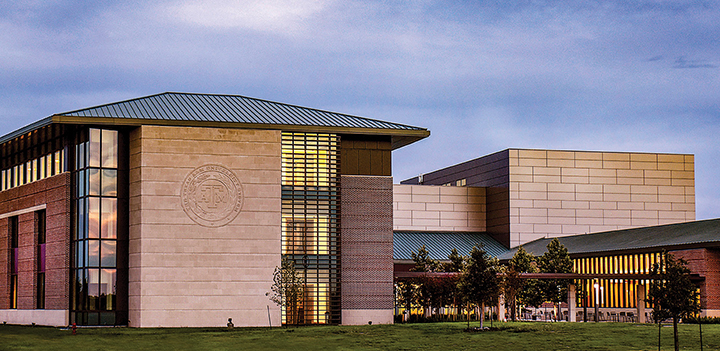
Center for Infrastructure Renewal (CIR) is a 138,000 square-foot facility located on the Texas A&M-RELLIS campus, with unique infrastructure lab facilities that integrate multidisciplinary research and workforce development to accelerate innovation into the public infrastructure sector. The CIR boasts several labs that focus on critical infrastructure sectors like roads and bridges, pipeline systems, materials and waste, advanced manufacturing, and the electrical grid.
Control Room Lab
Geotechnical and Unbound Materials Innovation Lab
National Corrosion and Materials Reliability Lab
Shield Lab for Infrastructure Protection
Structural and Materials Testing Lab
For TAMU individuals:
For Non-TAMU individuals:
| Hours | Location |
|
8:00 am - 5:00 pm |
Center for Infrastructure Renewal (CIR), |
| Name | Role | Phone | Location | |
|---|---|---|---|---|
| Anand Puppala |
Director
|
979-458-8933
|
anandp@tamu.edu
|
CIR, Rm 2307
|
| Pamela Mize |
Operations & Industry Engagement Specialist, CIR
|
979.458.8936
|
pamela.mize1@tamu.edu
|
CIR, Rm 2305
|
| Tom Overbye |
Director, Control Room Lab, SGC
|
979-458-5001
|
overbye@tamu.edu
|
WEB, Rm 308C
|
| Miroslav Begovic |
Associate Director, Control Room Lab, SGC
|
979-862-1553
|
begovic@tamu.edu
|
WEB, Rm 301I
|
| Andrea Kishne |
Administrator, Control Room Lab, SGC
|
979.458.8961
|
akishne@tamu.edu
|
CIR, Rm 3306
|
| Eric Keller |
Research Engineer, Control Room Lab, SGC
|
737-747-8951
|
erickeller@tamu.edu
|
CIR, Rm 3365
|
| Homero Castaneda |
Lab Supervisor, National Corrosion & Materials Reliability Lab
|
979-458-9844
|
hcastaneda@tamu.edu
|
CIR, Rm 3312
|
| Raymundo Case |
Associate Lab Supervisor, National Corrosion & Materials Reliability Lab
|
979-458-1090
|
raymundo.case@tamu.edu
|
CIR, Rm 3311
|
| Thomas Lacey Jr. |
Lab Supervisor, Shield Lab, Hypervelocity Impact Lab
|
979-845-9397
|
telacyjr@tamu.edu
|
MEOB, Rm 429
|
| Pete Keating |
Director, Structural & Materials Testing Lab
|
979-458.8940
|
p-keating@tamu.edu
|
CIR, Rm 1200
|
| Charlie Droddy |
Manager, Structural & Materials Testing Lab
|
979.458.8940
|
cdroddy@tamu.edu
|
CIR, Rm 1200
|
| Jonathan Snodgrass |
Assistant Director, Control Room Lab
|
979-473-9260
|
snodgrass@tamu.edu
|
CIR Rm 3365
|
| Nripojyoti Biswas |
Senior Research Engineer, Geotechnical and Unbound Materials Innovation Lab
|
979.458.8948
|
nripojyoti.biswas@tamu.edu
|
CIR, Rm 2318
|
| Sidney Davis |
Graduate Researcher, Shield Lab, Hypervelocity Impact Lab
|
sidney.davis@tamu.edu
|
CIR, Rm 2339
|
| Service List |
| ► Geotechnical & Unbound Materials (10) | |||
| Name | Description | Price | |
|---|---|---|---|
| CBR OneTest (AP) |
|
Inquire | |
| CBR Tests (AP) |
|
Inquire | |
| CDTxTest (AP) |
|
Inquire | |
| ConsolTest (AP) |
|
Inquire | |
| CUTxTest (AP) |
|
Inquire | |
| DS Test (AP) |
|
Inquire | |
| MR Test (AP) |
|
Inquire | |
| MS CDTx (AP) |
|
Inquire | |
| MS CUTx (AP) |
|
Inquire | |
| UUTxTest (AP) |
|
Inquire | |
| ► SMTL Load Frame (1) | |||
| Name | Description | Price | |
| 900 Ton Horizontal Load Frame |
|
Inquire | |
| ► SMTL Equipment Surcharge (5) | |||
| Name | Description | Price | |
| 1.5 million lb test frame |
|
Inquire | |
| 220 kip actuators |
|
Inquire | |
| 590C/400T kip actuators |
|
Inquire | |
| Machining surcharge |
|
Inquire | |
| Ultrasound equipment surcharge |
|
Inquire | |
| ► SMTL Long Term Fatigue Testing (1) | |||
| Name | Description | Price | |
| Long term fatigue testing |
|
Inquire | |
| ► SMTL MTS Servo Hydrolic Test Equipment Charge (1) | |||
| Name | Description | Price | |
| MTS servo hydrolic test equipment use |
|
Inquire | |
| ► SMTL Pipeline Bust/Proof Testing (4) | |||
| Name | Description | Price | |
| Pipeline Burst/Proof Testing - 16" to 24" dia | Inquire | ||
| Pipeline Burst/Proof Testing - 25" to 36" dia | Inquire | ||
| Pipeline Burst/Proof Testing - 37" to 42" dia | Inquire | ||
| Pipeline Burst/Proof Testing - Less than 16" dia | Inquire | ||